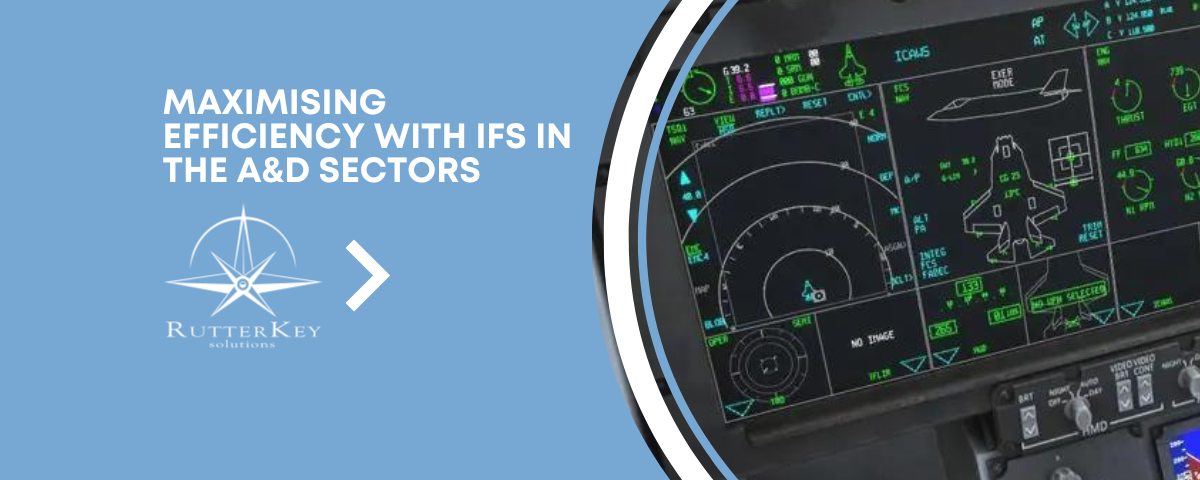
Why IFS is the Optimal ERP Choice for Manufacturing Companies
January 31, 2023
Maximizing the Benefits of IFS in the Construction Sector
February 2, 2023IFS has become increasingly important in the aerospace and defense sectors. IFS is a comprehensive approach to facility management that combines the latest technologies, processes, and data to provide a full solution to complex facility problems.
It is a holistic approach to facility management that looks at all aspects of the facility, from the physical building to the operational systems, to ensure they are running as efficiently and safely as possible.
IFS can provide organizations with an integrated view of their facilities, enabling them to make informed decisions regarding the maintenance and optimization of their operations.
IFS also provides organizations with the tools to effectively manage their facility’s assets, personnel, and processes. This can help organizations save time and money while improving safety and environmental performance.
The growing need for software solutions in aerospace and defense
The aerospace and defense sectors are highly complex and sophisticated, meaning they require robust and powerful software solutions to help manage the many tasks they face. With the increasing complexity of the technologies used in aerospace and defense, software solutions have become an increasingly important tool in managing various operations.
Software solutions are used to manage the various aspects of aerospace and defense operations. This includes tasks such as logistics management, flight safety, and maintenance operations. Software solutions can also be used to manage complex engineering processes such as designing new aircraft or weapons systems. Furthermore, software solutions are also used to manage communications, surveillance and intelligence, and data analysis tasks.
The growing need for software solutions in the aerospace and defense sectors is largely driven by the increasing complexity of the technologies used. Today’s aerospace and defense technologies are extremely advanced, making them difficult to manage without the aid of software solutions. Additionally, software solutions provide the necessary data and analytics to help organizations make better decisions and improve their operations.
Overall, the demand for software solutions in the aerospace and defense sectors is only growing as the complexity of the technologies involved continues to increase. As a result, organizations in these sectors must ensure they have the necessary software solutions to effectively manage their operations and stay ahead of the competition.
4 Benefits of IFS software in the aerospace and defense sectors
The following points are 4 of the advantages aerospace and defense companies can experience using IFS software.
1. Improved Efficiency
IFS software provides enhanced automation capabilities and streamlined processes that allow companies to complete complex tasks quickly and efficiently. This allows aerospace and defense companies to focus on their core competencies and deliver better products and services in a shorter time frame.
2. Increased Visibility
IFS software provides real-time visibility into every stage of the supply chain and into the various processes that occur during the production of complex hardware and systems. This helps aerospace and defense companies identify areas of inefficiency and make timely changes to meet customer requirements.
3. Cost Optimization
IFS software helps companies identify areas of cost wastage and reduce associated expenses. This can be achieved through the optimization of processes and the consolidation of resources.
4. Improved Compliance
IFS software helps aerospace and defense companies ensure regulatory compliance by providing them with up-to-date information on regulatory requirements. This can help reduce potential liabilities and ensure that companies are meeting their legal obligations.
4 Challenges Faced by Aerospace and Defense Companies Using IFS
The following points are some of the typical challenges experienced by companies in the aerospace and defense sectors using IFS.
1. Complex Integration
Aerospace and defense companies using IFS software must integrate their existing systems with the new IFS software, which can be a complex and costly process.
2. Security Challenges
Aerospace and defense companies need to be especially mindful of security when implementing IFS software. The software must be secure enough to protect sensitive information and prevent cyberattacks.
3. Cost
Implementing IFS software can be expensive. Aerospace and defense companies need to weigh the cost of the software against the potential benefits it can bring to their operations.
4. User Adoption
The success of IFS software relies on user adoption. Aerospace and defense companies must ensure their employees are properly trained to use the software and can use it effectively.
10 Recommendations for Aerospace and Defense Companies Implementing IFS
Below we have listed 10 of the most recommended actions for aerospace and defense companies to consider when implementing IFS software.
- Establish an implementation timeline to ensure the system is implemented in a timely and cost-effective manner.
- Create and maintain a project plan to track progress and milestones.
- Develop a comprehensive business case for the IFS software implementation that outlines the benefits and cost savings.
- Train staff on the new system to ensure proper usage and adoption.
- Establish a system for data migration, archiving, and audit trails.
- Design, develop, and implement effective security measures to protect sensitive information.
- Monitor system performance to ensure it is operating efficiently and effectively.
- Keep up to date with software updates, patches, and security fixes.
- Set up a knowledge base and support system to ensure users are getting the answers they need.
- Develop a strategy for ongoing maintenance and support of the system.
How to choose the right implementation partner in the aerospace and defense sectors
Below is a breakdown of the best actions organizations can take to inform their decision in choosing an IFS implementation partner.
1. Consider the Partner's Experience
Look for a partner that has extensive experience and expertise in the aerospace and defense sectors. Ask questions about their past projects and the challenges they have solved.
2. Look for a Proven Track Record
It's important to select a partner that has a proven track record for successfully developing, deploying, and maintaining IFS software solutions. Ask for references and case studies that demonstrate their success.
3. Ensure Relevant Expertise
Make sure the partner has the right combination of technical and functional expertise to successfully implement the IFS solution. Ask questions about their experience with similar projects and ensure they can provide the necessary resources.
4. Consider the Partner's Support Capabilities
Ask questions about the partner's support capabilities, including their response times and the level of expertise they can provide.
5. Assess Their Ability to Scale
Ensure the partner can scale their services to meet the needs of your business as it grows. Ask questions about their ability to provide additional resources and expertise as needed.
6. Consider Their Pricing Model
Compare the partner's pricing models to determine which one best meets your needs. Ask questions about their pricing model to ensure you are getting the best value for your money.
Contact RutterKey Solutions today to explore our experience and expertise in delivering IFS support to organizations working in the aerospace and defense sectors.
If you'd like to find out more about how IFS can be used in the A&D sectors or how RutterKey can help unlock IFS' full potential in your organization, fill out the form below.


